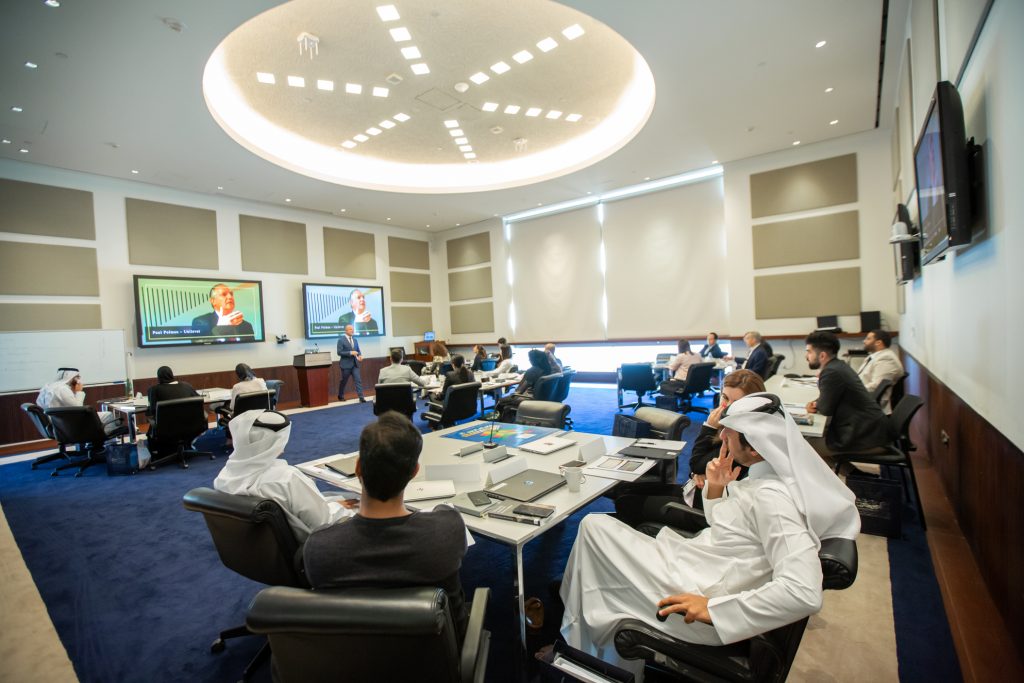Executive Master’s in Diplomacy and International Affairs

Overview:
The one-year Executive Master’s in Diplomacy and International Affairs (EMDIA) program seeks to enhance the ability of practitioners from Qatar and the Middle East region to formulate and implement effective foreign policy. The degree provides the participants with the knowledge, skills, and tools necessary to tackle current and emerging regional and global challenges.
Classes focus on 1) significant challenges in global politics and economics facing diplomats, 2) critical thinking skills related to the major tools of statecraft, and 3) areas of strategic importance to Qatar and the Middle East region.
Program Background:
Georgetown University’s Walsh School of Foreign Service (SFS) in Washington, D.C is a world-recognized, premier school of international affairs founded in 1919. Through its Institute for the Study of Diplomacy (ISD), SFS has created the EMDIA program in close collaboration with Georgetown University in Qatar and the Qatari Ministry of Foreign Affairs (MOFA).
Admissions:
The EMDIA is open to highly qualified:
• Qatari diplomats nominated by the Ministry of Foreign Affairs,
• Qatari officials engaged in foreign or national security policy at ministries and other government entities, and
• other practitioners interested in foreign or national security policy from Qatar and the
Middle East region.
The admissions criteria include:
• proof of a bachelor’s or post-graduate degree from a university of recognized standing where English is the primary language of instruction, or
• a minimum IELTS score of 7.0.
Georgetown University will conduct a holistic admission review process that includes:
• academic records,
• statement of purpose submitted by the applicant, and
• letters of recommendation,
• admissions interview, and,
• controlled writing exercise.
Curriculum, Faculty:
The year-long program consists of ten 3-credit modules consisting of 18 courses and one capstone visit to Washington D.C. Nine modules (18 courses) classes are taught at the Georgetown University-Qatar campus, predominantly by faculty affiliated with Georgetown’s main campus in Washington visiting Doha for five-day intensive teaching residences. The tenth module takes place at Georgetown’s main campus in Washington, D.C. It is a five-day course program to include intensive sessions with Georgetown faculty members and meetings with policymakers and international institutions.
The modules cover: 1) conflict resolution and negotiation; 2) international trade and development; 3) science and technology; 4) human security; 5) geopolitics and approaches to foreign policy; 6) regional studies; 7) soft power, culture and diplomacy; 8) transnational security challenges; 9) international law and institutions; and 10) policy-making and international institutions.
Notional Schedule:
Below are the expected course and residency dates for 2024-2025 academic year. The program’s class schedule accommodates religious and national holidays in Qatar, as well as official university holidays.
Fall 2024 Semester
| Course Name | Dates |
|---|---|
| Leadership and Crisis Management Conflict Resolution in Deeply Divided Societies | August 2024 Sat 8/10 – Wed 8/14 |
| Global Political Map – Part 1 Development Studies | September 2024 Sat 8/31 – Wed 9/4 |
| Global Political Map – Part 2 Refugees, Migration, and Humanitarian Crises | October 2024 Sat 10/5 – Wed 10/9 |
| International Law Global Environmental Security | November 2024 Sat 11/2 – Wed 11/6 |
| Public and Cultural Diplomacy Data and Diplomacy | December 2024 Sat 12/7 – Wed 12/11 |
Spring 2025 Semester
| Course Name | Dates |
|---|---|
| Small States/Alliance Diplomacy: Gulf Case Study Food Security, Water, and the Environment | January 2025 Sat 1/4 – Wed 1/8 |
| International Economics for Practitioners Energy and Diplomacy | February 2025 Sat 2/15 – Wed 2/19 |
| International Law and Multilateral Diplomacy Negotiation, Mediation & Political Persuasion on the Global Stage | April 2025 Sat 4/26 – Wed 4/30 |
| Chinese Diplomacy Goes Global Nuclear Weapons and International and Regional Security | May 2025 Sat 5/31 – Wed 6/4 |
Summer 2025 (DC Residency)
| Course Name | Dates |
|---|---|
| Policy-making and International Institutions | June 2025 Mon 6/23 – Fri 6/27 |
*Note: Course details including course titles, scheduled dates, and sequencing are subject to change.
Application Process
To start, or continue, the application process for Fall 2024 please use this link: https://forms.gle/fjFuodzh8GLDKeDE9. The application deadline for nominees is April 18, 2024.
For any questions, please contact:
Reine Atrach
rja26@georgetown.edu
+974-4457-8415
Program Manager
Office of Executive and Professional Education
Georgetown University in Qatar